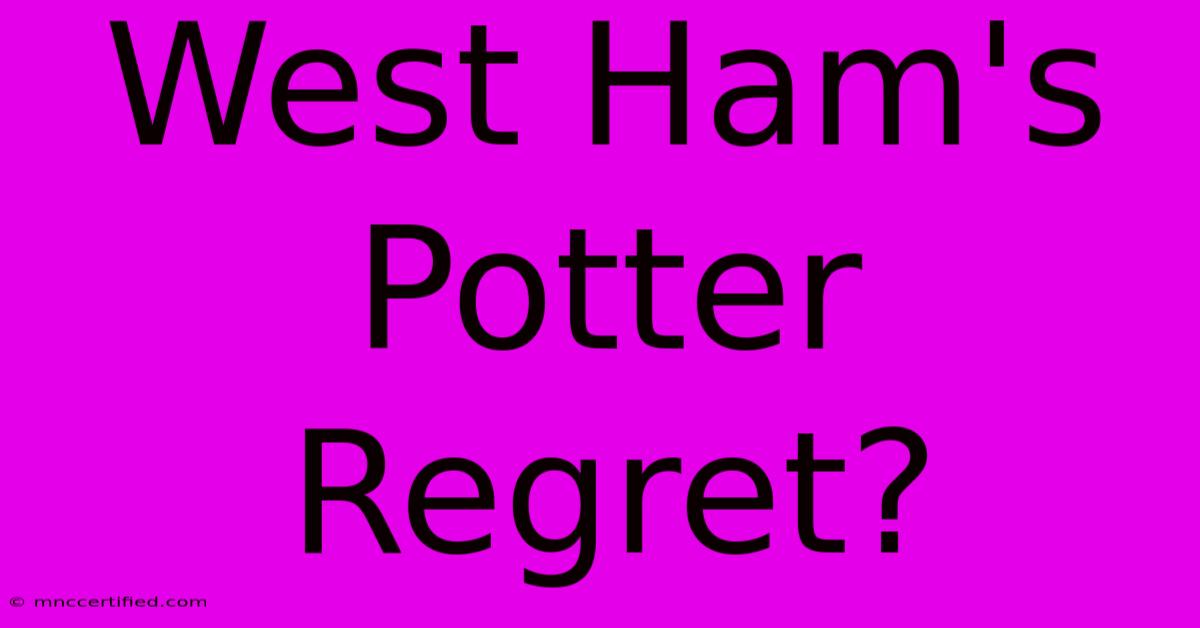West Ham's Potter Regret?

Table of Contents
West Ham's Potter Regret? Analyzing the Missed Opportunity
West Ham United's recent struggles have sparked considerable debate amongst fans, with many questioning the club's summer transfer decisions. One name consistently cropping up in these discussions is Graham Potter, the former Brighton manager now at Chelsea. Was letting Potter slip through their fingers a massive mistake? Let's delve into the potential "Potter Regret" brewing at the London Stadium.
The Potter Puzzle: Why West Ham Considered Him
Before his high-profile move to Chelsea, Graham Potter was making waves at Brighton. His innovative tactics, player development prowess, and impressive results against bigger clubs made him a highly sought-after manager. Reports suggested West Ham were seriously considering Potter as a potential replacement for David Moyes before opting for Moyes' continued stewardship.
Tactical Flexibility: A Missing Ingredient at West Ham?
West Ham, under Moyes, have often been criticized for a lack of tactical flexibility. Potter, on the other hand, is renowned for his adaptable approach, employing various formations and strategies depending on the opposition. This tactical fluidity is something West Ham often seem to lack, leading to predictable performances and struggles against well-organized defenses. Could Potter's tactical nous have unlocked West Ham's attacking potential and improved their overall consistency?
Player Development: A Key Differentiator
Potter’s success at Brighton wasn’t solely based on tactical brilliance; it was also driven by his ability to nurture and develop young talent. He transformed relatively unknown players into Premier League stars. This is a crucial aspect often overlooked in managerial assessments. Could Potter have helped unlock the potential of West Ham's promising academy players and improved the overall squad depth?
The Moyes Factor: A Difficult Comparison
Comparing Potter and Moyes is complex. Moyes boasts significant Premier League experience and has delivered European success for West Ham. However, the club’s recent form suggests a potential ceiling under his management. Is Moyes' experience outweighing Potter's potential for innovation and long-term growth? This is the core of the "Potter Regret" debate.
Results Speak Volumes (But Not Always)
While Moyes has achieved commendable results in the past, West Ham's current league position and inconsistent performances fuel the "what if" scenario surrounding Potter. Success isn't solely measured in trophies; it also considers sustainable growth and development. Did West Ham prioritize short-term gains over long-term potential by sticking with Moyes?
The Bigger Picture: Beyond Potter
The "Potter Regret" narrative shouldn't overshadow the broader issues at West Ham. Transfer strategy, squad depth, and overall club vision are all interconnected factors influencing the team's performance. While Potter might have offered a different approach, his appointment wouldn't have magically solved all the club's problems.
Conclusion: A Speculative, Yet Valid, Concern
Whether West Ham truly made a mistake by not appointing Graham Potter is a matter of conjecture. However, considering Potter's subsequent success at Brighton and his tactical flexibility compared to Moyes' more pragmatic approach, it's understandable why many fans are questioning the decision. The debate highlights the complexities of managerial appointments and the long-term implications of choosing between experience and potential. Only time will tell if West Ham's choice ultimately proves to be the right one. The performance of both managers in the coming seasons will surely add further fuel to this ongoing discussion.
Keywords: West Ham, Graham Potter, David Moyes, Premier League, tactical flexibility, player development, transfer strategy, football manager, West Ham manager, Brighton, Chelsea, football tactics, football analysis, West Ham regret, potential regret.

Thank you for visiting our website wich cover about West Ham's Potter Regret?. We hope the information provided has been useful to you. Feel free to contact us if you have any questions or need further assistance. See you next time and dont miss to bookmark.
Featured Posts
-
The North River Insurance
Dec 10, 2024
-
Sani Insurance Agency Inc
Dec 10, 2024
-
Senate Run Lara Trump Exits Gop Role
Dec 10, 2024
-
Daniel Penny Trial Familys Response
Dec 10, 2024
-
Nationwide Customers Get 100 Bonus
Dec 10, 2024